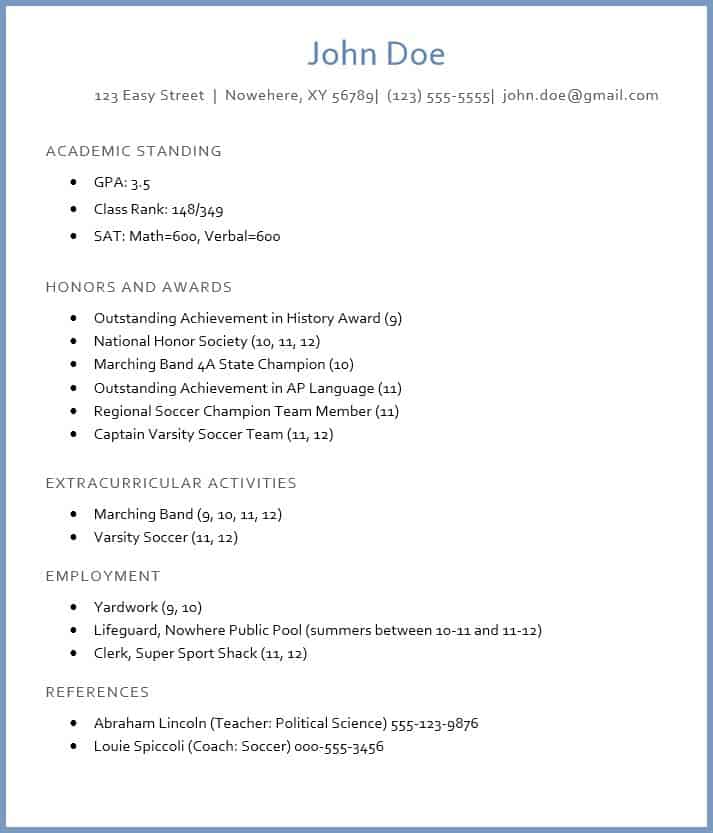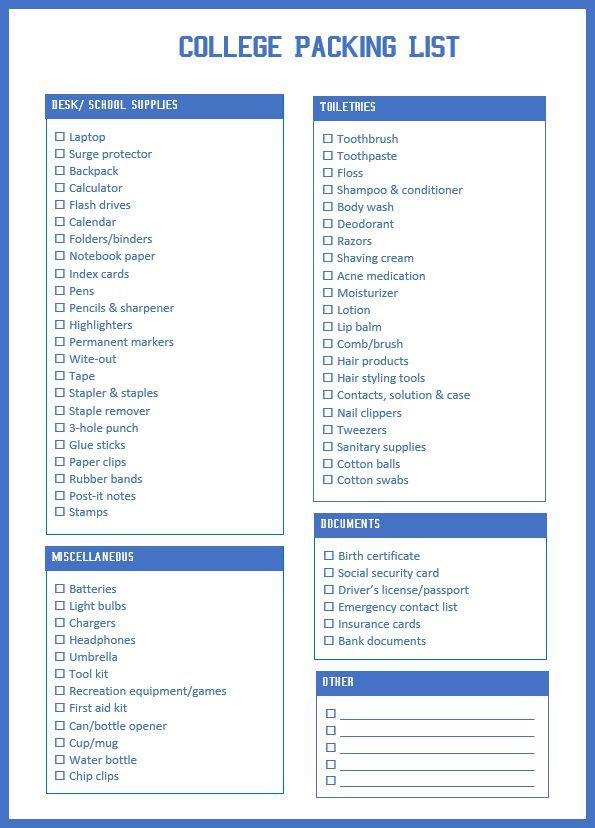Many students don’t realize the importance of creating a college admission résumé while they are in high school. The truth is, if you want to go to college, putting together this one sheet summary of your high school accomplishments is extremely important.

When my oldest child was a junior in high school we were fully immersed in college prep activities including campus visits and scholarship applications. One of the best pieces of advice we received while making these preparations was to prepare a résumé of my son’s high school achievements.
By taking the time to chronicle all of his accomplishments, the process of filling out college and scholarship applications was much easier. By condensing one’s greatest achievements to an easy-to-read, one-page summary, you make it easier for colleges and benefactors to glean what they need to know about you and impress them with your professionalism and foresight in the process.
Why Write a College Admission Résumé
If the idea of a college admission résumé is new to you, you might be wondering if it’s even necessary. I think so and these benefits are the reason why.
Identify Areas for Improvement
Ideally, you will participate in activities you genuinely enjoy. This doesn’t mean that you should ignore the fact that colleges want students who are well rounded and have proven time management skills.
When you lay out all your achievements and activities on one page, it’s easy to see whether or not you exemplify that type of student. If you are a stellar student with high grades, the lack of extracurricular activities on your résumé might inspire you to join a club or take up a sport. If you are an accomplished athlete who struggles with academics, you can perhaps bolster your image by beefing up your community service and other extracurricular activities.
Make Headway with College Recruiters
When you attend college fairs, often there are so many schools and potential students that you rarely get to spend much time with recruiters. If you bring copies of your résumé with you, recruiters can easily scan them and give you quick feedback about how well your skills match with their offerings. It also leaves them with a way to contact you afterwards to share more detailed information.
Gives a Comprehensive View of You
Not all college applications let you express all of the wonderful things about yourself that make you an attractive candidate. You can put your best foot forward and give them a complete view of who you are as a person and student in the résumé that you create.
Provides a Quick Reference of All Relevant Details
Most colleges and scholarship grantors have their own application forms that they require you to complete. Since the formats vary, it can be easy to forget one or two achievements or distinctions when you fill them in. Your résumé contains all of that information so that you can use it as a reference form when filling out those applications.
Multiple Uses
A résumé consisting of your high school achievements can be used for much more than college admissions. In addition to the other uses listed above (e.g. scholarship applications and networking with college recruiters), you can also use your résumé when you apply for jobs, internships, and study-abroad opportunities.
What to Include
Your résumé can be as unique as you are, but for the purposes of sharing key information it should include the following items:
Personal Information
- Name
- Address
- Phone Number
Academic Achievements
- Grade Point Average
- Class Rank or Percentile
- Standardized Test Scores
- Honor Roll
- Completed College-Level Coursework (e.g. AP credits)
Honors and Awards
List every award or special distinction received while in high school. Don’t limit yourself to academic awards here (though those should be listed as well). Remember to include district, regional, or state champion status for sports, band, etc.
Extracurricular Activities
When listing your activities, be sure to note if you held an office or leadership role in the group. Also indicate which years you participated in each activity by placing the appropriate grade levels in parentheses (e.g. 9, 10, 11).
- Sports
- Music
- Clubs
- Church
Community Service
- Volunteer Experience
- Participation or Coordination of Fundraising Projects
Additional Activities
- Work Experience
- Hobbies
- Foreign Travel
References
Provide the names, phone numbers and e-mail addresses of individuals who can vouch for your abilities and achievements.
- Teachers
- Coaches
- Employers
College Admission Résumé Do’s
When creating your college admission résumé make sure you do these things:
Use Bullet Points
- Start each bullet point with an action verb
- Write concisely
Write Well
- Be organized
- Use proper grammar
- Proofread
Keep It Brief
- In most cases, you will be required to submit an essay with your application so save the rhetoric for there
- Aim for one page, but definitely don’t go beyond two pages
Format Properly
- Be consistent (e.g. bold all headings, use same font throughout, either use periods at end of bullets or not at all)
- Spell things out rather than using abbreviations (e.g. “National Honor Society” instead of “NHS”)
- List grades by number not ordinals (e.g. write “9” instead of “9th” to indicate freshman year)
- Stick with professional fonts such as Times New Roman or Arial
College Admission Résumé Don’ts
Just as important as the things you should do are things you should avoid doing. When writing your college admission résumé don’t:
Be Overly Modest
- Promote yourself—This is the time to brag about all you have accomplished!
- Touting your achievements is not bragging on a résumé—It provides a picture of what you can do
Embellish
- Worse than selling yourself short is lying
- Exaggerated skills or experience can do more damage than good
List Awards That Aren’t Recognized
- Who’s Who Among American High School Students will not impress the admissions committee
- Science Fair Participant isn’t an achievement
Include Your School’s Information
- Save the limited space for your information
- This information will be included in other places (e.g. application form, transcripts)
The sooner you start creating your college admission résumé, the better. Since colleges won’t care about your middle school achievements, once you start high school is the best time to begin. Begin with a file where you will store all of the certificates, report cards, letters of recommendation, newsletters, and a volunteer log. If you keep everything in one place, it will be easier to put the résumé together when you are finally ready to start handing it out.
Click the image below to get access to the template for the sample college admission résumé. When the new tab opens, click the download icon in the upper right corner.
More Information for College-Bound Students
If you have a child preparing for college, here are some other posts full of information to help you both prepare:








Great points–although it’s a while before we have to write one, we are keeping track already.
What a great article. My daughter recently graduated from college, but all of these tips are good for job applications also.
I like your “Dont’s”. Thank you for sharing this. Great content here!
Hi Corinne – Wow, and I thought 4th grade “mental math” was hard. I’m so glad I’m finally an adult (LOL) but now it’s even harder preparing your kids for life outside the nest. Thanks for the great advice! Hugs, Holly
Great tips – thanks so much for the guidelines (especially adding which years participated for activities and awards).
This is great, I really love how you have everything compiled.
Wow! What a great list! I like the example with the actual resume too! Thanks for being so thorough!
Wow, I thought going to college was easier than this but I can see how writing a resume can help.
Wow! I had no idea that’s so complicated! Looks like a huge project to prepare everything and be ready. So good to read that now- while my kids are still in the middle school. Thank you for sharing. I’ll definitely pin it for later 🙂
My oldest is now a sophomore in college, and was a high school over-achiever. We struggled to condense that resume to one page!
An added tip for those with younger students — start the resume freshman year and add as you go. Seems silly the first year, but it’s SOOOOO much easier than digging through everything while facing application deadlines!
Son number two is definitely benefitting from his brother’s experiences. 🙂